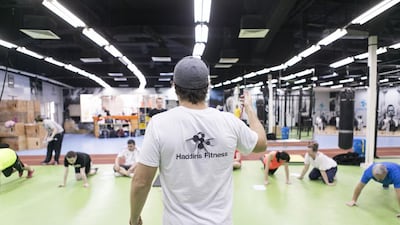On a rainy morning this week, 20 staff members from The National shuffled into Haddins Fitness at Zayed Sports City to begin their eight-week Fitness Challenge.
The first session – led by the gym’s managing director, Michael Haddin, and personal trainer Sam Bolger – began with a fitness assessment. Height, weight, hip-to-waist ratio, blood pressure, resting heart rate and flexibility were assessed, using measuring tapes and scales, sit and reach tests and blood-pressure machines. What seemed straight forward left many sheepishly hiding the numbers that were jotted down on their personal assessment chart.
Waiting to complete each assessment, many lamented both the lack of sleep from the night before and the time that had lapsed since their last gym session. "It has been five long years since I exercised regularly, so I was a bit nervous walking into the gym today," said Stacie Overton Johnson, The National's food writer and restaurant critic, who added that she was a competitive athlete for most of her life.
Once we had finished the tests, and after a brief introduction from Haddin and Bolger, it was time to get to work. We were divided into pairs – first running through a warm-up of squats, skipping, lunges and bear crawls – and then moving on to the core of the assessment. Each pair was asked to complete as many push-ups, squats and sit-ups as possible in 60-second bouts. The group was then asked to plank for as long as possible (this was timed), followed by a timed 500-metre row.
Each assessment tested one of seven parameters: body measurements, health indicators, muscle strength, core stability, flexibility, cardiovascular capacity and energy levels. This, according to Haddin, allows each participant to gain a “greater understanding” of their current health and “clearly identify areas of strength and weakness in their current well-being”. The aim is for these numbers to improve by the end of week eight.
What, then, has each group endured during the first week of the challenge? Personal trainer Vivienne Farrell, mentor for the Primal Transformation group, one of three that participants have been put into, says her group started with a four-day detox. “The aim is to neutralise the body,” she says.
While the group undergoes the detox, fitness requirements will be fairly low-key.
“The goal is to get the body moving through exercises that will become common practice over the coming weeks,” says Farrell. “We are looking to get 30 minutes of light physical activity each day during this detox period.”
Judging by the grumbles from various parts of the newsroom, the term “light” is up for debate.
Bolger, mentor for the WOD group, says his group has been “thrown into the deep end”. “The WOD programme is designed to develop all components of fitness and allows the participants to work at a level suitable to them. And though they will be going straight into the full session, the coaches will be paying particular attention to form and the participants’ intensity levels in the first week to ensure a safe, injury-free start to the programme.”
Haddin, who is training the Triathlon group, says that this week is all about building the foundations.
“We are looking to develop a sense of team, educate the group on the importance of prehabilitation [preventing injuries before they occur] and cover the distance in each of the three disciplines [running, cycling and swimming], whatever way the group can,” he says.
As for the group members? Thoughts on the fitness assessment were mainly positive. Adam Workman, who works with The National's Weekend section and is in the WOD group, says that the introduction was a bit more "energetic" than he had expected, but that it wasn't unmanageable.
“I’m a little daunted about what might be in store, but glad that I’m getting this push to get fitter and a bit trimmer,” he adds. “Doing five workouts a week is quite a commitment, but I’m going to try to vary the times to mix it up.”
alane@thenational.ae

